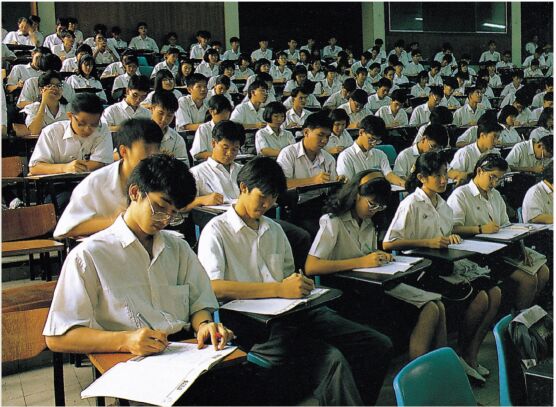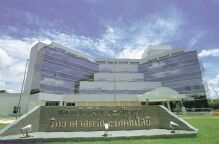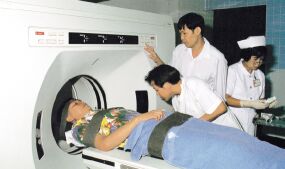
New Partnership Agreement
with Kyushu University
MAHIDOL UNIVERSITY
(Thailand)
Hideo Utsumi
Professor, Graduate School of Pharmaceutical Sciences


New Partnership Agreement
Hideo Utsumi |
Organization
Mahidol University has fourteen faculties
(Medicine Siriraj Hospital,
Medicine Ramathibodi Hospital,
Tropical Medicine, Public Health,
Medicine Technology, Science,
Graduate Studies, Dentistry,
Pharmacy, Social Sciences and
Humanities, Nursing, Engineering,
Environment and Resource Studies,
and Veterinary Science), six colleges,
seven institutes, and six academic
centers. In 1999, there are approximately
12,000 undergraduate students,
7,500 postgraduate students
and 2,800 academic staff 4,200 academic
assistants, and 4,300 administrative
personnel. Students and Staff
are located on three main campuses
in Bangkok and a modern campus in
Nakhon Pathom, 20 km west of
Bangkok.
International Academic
Co-operation in Mahidol
University
 Mahidol University is one of the most
prestigious universities in Thailand
and an internationally renowned institution,
especially in the field of medicine
and science. Its traditional prominence
is reflected in its numerous
international publications and many
international awards. Indeed, some
50% of the international publications
from all the science faculties in
Thailand come from Mahidol
University.
Mahidol University is one of the most
prestigious universities in Thailand
and an internationally renowned institution,
especially in the field of medicine
and science. Its traditional prominence
is reflected in its numerous
international publications and many
international awards. Indeed, some
50% of the international publications
from all the science faculties in
Thailand come from Mahidol
University.
Mahidol University is one of the leaders
in the " internationalization " of
higher education, and has 154 of
exchange agreements with foreign
institutions including Kyushu
University (the Faculties of
Pharmaceutical Sciences and
Agriculture). More recently, Mahidol
University has expanded the number
of academic courses taught in English
(110 courses in total 500, and more
than half of 45 Ph.D. courses), and
students from 45 different countries
are currently enrolled in various programs
at the University.
Partnership with Kyushu
University
 Taken as a whole, the history and profile
of Mahidol University is quite similar
to that of Kyushu University. And,
in August of 2000, an agreement for
academic co-operation and a memorandum
on student exchange were
first signed up by the Faculty of
Science, Mahidol University and the
Faculty of Pharmaceutical Sciences,
Kyushu University, and then between
the Faculty of Science, Mahidol
University and the Faculty of
Agriculture, Kyushu University. The
faculty of Science was founded as a
Premedical School of Mahidol
University in 1958, and has some
departments relating to faculties of
Pharmaceutical Sciences and
Agriculture in Kyushu University.
Taken as a whole, the history and profile
of Mahidol University is quite similar
to that of Kyushu University. And,
in August of 2000, an agreement for
academic co-operation and a memorandum
on student exchange were
first signed up by the Faculty of
Science, Mahidol University and the
Faculty of Pharmaceutical Sciences,
Kyushu University, and then between
the Faculty of Science, Mahidol
University and the Faculty of
Agriculture, Kyushu University. The
faculty of Science was founded as a
Premedical School of Mahidol
University in 1958, and has some
departments relating to faculties of
Pharmaceutical Sciences and
Agriculture in Kyushu University.
Thereafter, the additional agreement
was signed between the Faculty of
Pharmacy, Mahidol University and the
Faculty of Pharmaceutical Sciences,
Kyushu University. There are also
some collaborations between both
universities' schools of medicine in the
research of diseases including Malaria
and Thalassemia, and both deans
have visited each other.
Last December, the "2000
Conference of Asian University
Presidents" was held at Kyushu
University. The Reprisentatives of
Mahidol University were invited to the
Conference and discussed with
Kyushu University's faculty members
the possibility of beginning new cooperative
relations. All of these endeavors
may produce more tight and successful
partnership not only between
Mahidol University and Kyushu
University but also in "KUARO"
(Kyushu University Asian Research
Organization).
For more information on Mahidol
University, please visit:
http://www.mahidol.ac.th
Dr. Hideo Utsumi obtained doctor's degree from
Graduate School of Pharmaceutical Sciences,
University of Tokyo in 1976. After taking positions at
Teikyo University and Showa University, he became a
professor, Faculty of Pharmaceutical Sciences, Kyushu
University in 1994. He is specialized in In vivo ESR-CT
and Reactive Oxygen Species in Diseases or
Environmental Pollutants. From 1990, he is collaborating
with Profs. Udom and Suthat in Mahidol University
about Thalassemia Disease, and accepted students
from Thailand. From 1996 to 2000, he was the leader of
the Research Project for Creation of Future Environment
in Environmental Agency.